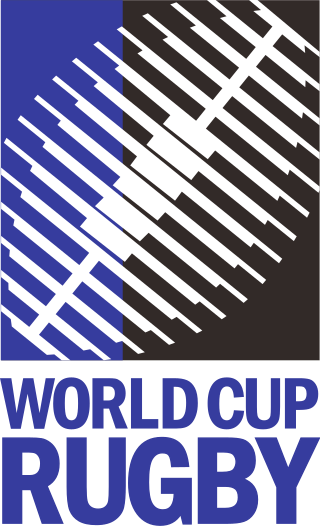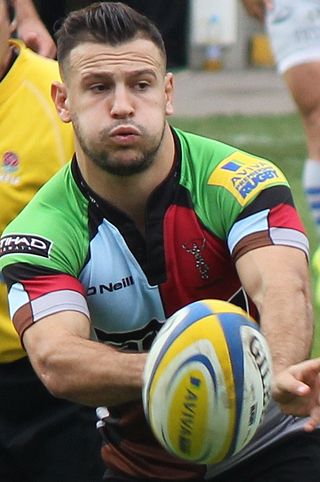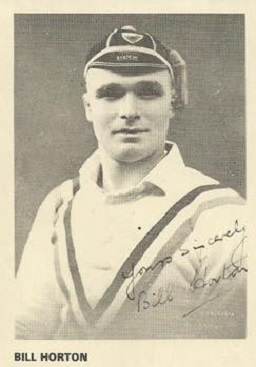
The 1987 Rugby World Cup was the first Rugby World Cup. It was co-hosted by New Zealand and Australia – New Zealand hosted 21 matches while Australia hosted 11 matches. The tournament was won by New Zealand, who were the strong favourites and won all their matches comfortably. New Zealand defeated France 29–9 in the final at Eden Park in Auckland. The New Zealand team was captained by David Kirk and included such rugby greats as Sean Fitzpatrick, John Kirwan, Grant Fox and Michael Jones. Wales finished third, and Australia fourth, after conceding crucial tries in the dying seconds of both their semi-final against France and the third-place play-off against Wales.
Geoff Cooke OBE is a former rugby union player, an England Rugby coach and manager of the 1993 British Lions rugby union tour to New Zealand.
Michael Clive Teague is a former England and British Lions rugby union footballer.
Terence David Holmes is a Welsh former rugby union, and professional rugby league footballer who won 25 caps for Wales as a scrum-half, and later played rugby league for Bradford Northern.

Daniel Stuart Care is an English professional rugby union player who plays as a scrum-half for Premiership Rugby club Harlequins and the England national team.
John Scott is a former rugby union international who represented England from 1978 to 1984.

Jonathan "Jonty" Parkin (1894–1972) was an English professional rugby league footballer who played the 1910s, 1920s and 1930s. One of the nine inaugural inductees of the Rugby Football League Hall of Fame, he toured Australia three times, twice as captain of Great Britain, earning 17 Test caps. Parkin played at stand-off or scrum-half, and also captained England for whom he made 12 appearances, as well as 17 for Yorkshire. Parkin gave the Wakefield Trinity club seventeen years' service, including victory in the 1924–25 Yorkshire Cup.
John Southern Spencer is a former England international rugby union player.
Steve Brain is a retired rugby union player who played hooker for Coventry R.F.C. and represented England in over a dozen international matches, including three Five Nations, now the Six Nations Championship, between 1984 and 1986.

William Horton was an English professional rugby league footballer who played in the 1920s and 1930s. He played at representative level for Great Britain, England and Yorkshire, and at club level for Wakefield Trinity (captain), as a second-row, or loose forward, i.e. number 11 or 12, or 13, during the era of contested scrums.
Thomas "Tommy" Henry Newbould, also known by the nickname of 'Trapper', was an English rugby union, and professional rugby league footballer who played in the 1900s, 1910s, and 1920s. He played representative level rugby union (RU) for Yorkshire, and at club level for Castleford Parish Church RFC and Castleford RUFC, and representative level rugby league (RL) for Great Britain, England and Yorkshire, and at club level for Wakefield Trinity (captain), York and Castleford Rovers as a stand-off or scrum-half, i.e. number 6, or 7.
Herbert Kershaw, also known by the nickname of "Harry", was an English rugby union, and professional rugby league footballer who played in the 1900s, 1910s and 1920s. He played representative level rugby union (RU) for Yorkshire, and at club level for Wakefield RFC, and representative level rugby league (RL) for Great Britain, England and Yorkshire, and at club level for Wakefield Trinity (captain), as a forward, during the era of contested scrums.

Harold Poynton also known by the nicknames "Fishcake", "Poynton the Pippin", and "Prince of Bamboozlers", was an English professional rugby league footballer who played in the 1950s and 1960s. He played at representative level for Great Britain and Yorkshire, and at club level for Wakefield Trinity (captain), as a stand-off, or scrum-half, i.e. number 6, or 7.

Herbert Goodfellow, also known by the nickname of "Goody", was an English professional rugby league footballer who played in the 1930s, 1940s and 1950s. He played at representative level for England and Yorkshire, and at club level for Wakefield Trinity (captain), Batley, Castleford and Oldham, as a scrum-half, i.e. number 7.
Trevor Skerrett is an English former professional rugby league footballer who played in the 1970s and 1980s. He played at representative level for Great Britain (Under-24s), Great Britain and Wales, and at club level for Wakefield Trinity, Hull F.C., Leeds and Keighley, as a prop, or second-row.
Thomas "Tommy" Smales was an English professional rugby league footballer who played in the 1950s, 1960s and 1970s, and coached in the 1960s and 1970s. He played at representative level for Great Britain and England, and at club level for Castleford, Huddersfield (captain), Bradford Northern, North Sydney Bears and Wakefield Trinity as a scrum-half, i.e. number 7, and coached at club level for Castleford and Featherstone Rovers.

Frederick "Eric" E. Batten was an English rugby union and professional rugby league footballer who played in the 1930s, 1940s and 1950s, and coached rugby league in the 1950s. He played club level rugby league (RU) for Sandal RUFC, and representative level rugby league (RL) for Great Britain and England, and at club level for Wakefield Trinity, Hunslet, Featherstone Rovers (captain), Leeds, Castleford and Bradford Northern, as a wing, and coached at club level for Featherstone Rovers, and Batley. Eric Batten appeared in eight Challenge Cup Finals; two for Leeds, five for Bradford Northern, and one for Featherstone Rovers, winning three, and losing five, he scored a total of 443 tries during his career, he his third on the all-time try scorers list behind Brian Bevan, and Billy Boston,

Michael "Mick" D. Shoebottom, also known by the nickname "Shoey", was an English professional rugby league footballer who played in the 1960s and 1970s. He played at representative level for Great Britain, England and Yorkshire, and at club level for Bison ARLFC and Leeds, as a fullback, centre, stand-off or scrum-half, i.e. number 1, 3 or 4, 6, or 7.
Bryan Barley was a former England international rugby union centre.

Francis Nathaniel Tarr was an English international rugby union player. He played centre for the Leicester Tigers and, between 1909 and 1913, won four caps for England, scoring two tries. He also earned three Blues while reading law at Oxford.








